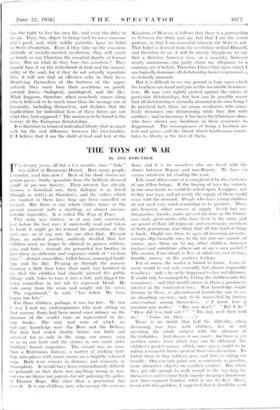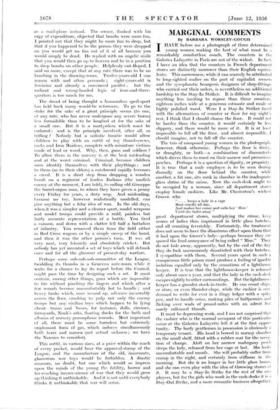THE TOYS OF WAR
By JAN STRUTHER
IT is twenty years, all but a few months, since " Saki " was killed at Beaumont-Hamel. How many people, I wonder, read him now ? Most of his short stories are period pieces, frothy spoonfuls from the brilliant doomed ,olge of pre-war Society. Their interest has already become a historical one, their dialogue is as dated (though as witty) as Sheridan's, and the values which arc implicit in them have long ago been cancelled or revised. But there is one which strikes home at the present moment with a startling, an almost uncom- fortable topicality. It is called The Toys of Peace.
This story was written, or at any rate conceived, just before the last war : if universally read and taken to heart it might go far toward the prevention of the next one—or at any rate the one after that. Eleanor lope, an ardent pacifist, suddenly decided that her children must no longer be allowed to possess soldiers, guns and forts : instead, she persuaded her brother to give them an elaborate and expensive outfit of " civilian toys "—district councillors, ballot-boxes, municipal build- ings and the like. Peeping in through the nursery doorway a little time later, their uncle was horrified to sec th.;t the children had already pierced the public library with holes to turn it into a fort, and dipped the town councillors in red ink to represent blood. He stole away from the room and sought out his sister. " The experiment," he said, " has failed. We have begun too late."
For those children, perhaps, it was too late. We (for it was I and my contemporaries who were sitting on that nursery floor) had been raised since infancy on the glamour of the scarlet coat, as represented in his- tory books. The only real wars of which we had any knowledge were the Boer and the Balkan. The first had ended shortly before our birth and survived for us only in the songs our nurses sang to us in our bath and the stories in our much older brothers' bound magazines. The second was no more than a Ruritanian fantasy, a matter of sticking little flags into places with comic names on a brightly coloured inap. Both were remote in distance and romantic in atmosphere. It would have been extraordinarily difficult to persuade us that there was anything wrong in war, nor can we blame our parents for not pursuing the policy of Eleanor Bope. But since then a generation has passed. It is our children, now, who occupy the nursery floor, and it is we ourselves who arc faced with the choice between Bopery and non-Bopery. We have eo excuse whatever for evading the issue.
Like most other issues it is complicated by the existence of our fellow-beings. If the buying of toys In entirely in our own hands we could be relied upon, I suppose, not to buy war toys, and presently the supply of them would cease with the demand. Peol de who have young children do not need very much reminding to be pacifist s. There are, however, other sources of supply - lavish but un- imaginative friends, aunts pressed for time in the Christi max rush, great-uncles who have been in the army and are proud of their old regiment, and reactionary members of both generations who think that all this kind of thing is bunk. Ought one, then, to open all incoming presents-, consign objectionable ones to the fire (for one cannot, of course, pass them on to any other children, however toyless) and substitute others out of one's own pocket ? The answer, I am afraid, is Yes, at whatever cost or time, trouble, money, or the sender's feelings.
For of course the sender is bound to know. Conceal- ment would be not only cowardly but almost impossible to achieve--unle:-;s he orshe happened to live in California. It could only be managed by letting the children into the conspiracy : and that would arouse in them a passionate interest in the confiscated toys. War knowledge might become to them, as physiological knowledge was to us, an absorbing mystery, only to he unravelled by furtive conversation among themselves. ("I know how a machine-gun works." " Bet you don't." " Bet I do." " How did you find out ? " " The boy next door told me." " Come on, then . . .") There is no doubt that half the difficulty, when discussing war toys with children, lies in not investing the whole subject with the glamour of the forbidden. And discuss it one must' : for there is yet another source from which toys can be obtained --the children's pocket-money, which, once given, ought to be within reasonable limits spent at their own discretion. To forbid them to buy soldiers, guns and forts is iisking for trouble. One can only point out, as carelessly as possible, more attractive objects on another counter. But when they get old enough to walk round to the toy-shop by themselves and to come back eagerly clasping a handsome new three-engined bomber, what is one to do ? Onee', faced with this problem, I suggested that it should be used as a mail-plane instead. The owner, flushed with his orgy of expenditure, objected that bombs were more fun. I pointed out that they might be more fun to drop, but that. if you happened to be the person they were dropped on you would get no fun out of it at all becauie you would simply be dead. He replied with an angelic smile that you would then go up to heaven and be in a position to drop bombs on other people. Helplessly out-Boped, I said no more, except that at any rate there was to be no bombing in the drawing-room. Twelve-years-old I can reason with and often persuade ; eight-years-old is feminine and already a convinced pacifist : but the radiant and wrong-headed logic of four-and-three- quarters is too much for me.
The dread of being thought a humourless spoil-sport has held back many would-be reformers. To go to the stake for the sake of a great principle seems (to one, at any rate, who has never undergone any severe burns) less formidable than to be laughed at for the sake of a small one. But it is a martyrdom which must be endured : and is the principle involved, after all, so trifling ? Nobody but a sadistic lunatic would allow children to play with an outfit of toy thumbscrews, racks and Iron Maidens, complete with miniature victims made of lead or wood. Why, then, guns and soldiers ? To allow them in the nursery is at the best misleading and at the worst criminal. Criminal, because children soon identify themselves . with their playthings ; and to them (as to their elders) a catchword rapidly becomes a creed. It is a short step from dropping a wooden bomb on a regiment of leaden Italians (the . modish enemy at the moment, I am -told), to calling old Giuseppe the barrel-organ man, to whom they have given a penny every Friday for years, a dirty wop. And misleading, because no toy, however realistically modelled, can give anything but a false idea of war. In the old days, when it was a simpler and a cleaner sport,. model weapons and model troops could provide a mild, painless but fairly accurate representation of a battle. You fired a cannon, and down with a clatter fell half a battalion of infantry. You removed them from the field either in Red Cross wagons or by a simple sweep of the hand, and then it was the other person's turn. It was all very neat, very leisurely and absolutely cricket. But nobody has yet invented a set of toys which will debunk once and for all the glamour of present-day warfare.
Perhaps some sub-sub-sub-committee of the League, twiddling its thumbs in a Genevan ante-room while it waits for a chance to lay its report before the Council, might pass the time by designing such a set. It must contain, among other things, guns which are impossible to fire without pinching the lingers and which after a few rounds become uncomfortably hot to handle ; and heavy tanks which, once wound up, advance inexorably across the floor, crushing to pulp not only the enemy troops but any civilian toys which happen to be lying about—trains and 'buses, for instance, dolls, circuses, farmyards, Noah's arks, floating ducks for the bath and albums of nursery gramophone records. Most important of all, there must be some harmless but extremely unpleasant form of gas, which induces simultaneously both tears and nausea (not actual sickness ; we have the Nannies to consider).
This outfit, in various sizes, at a price within the reach of every pocket, would bear the approval-stamp of the League, and the manufacture of the old, inaccurate, glamorous war toys would be forbidden. A drastic measure, no doubt, but one which would so impress upon the minds of the young the futility, horror and far-reaching inconvenience of war that they would grow up thinking it unthinkable. And it is not until everybody thinks it unthinkable that war will cease.























































 Previous page
Previous page